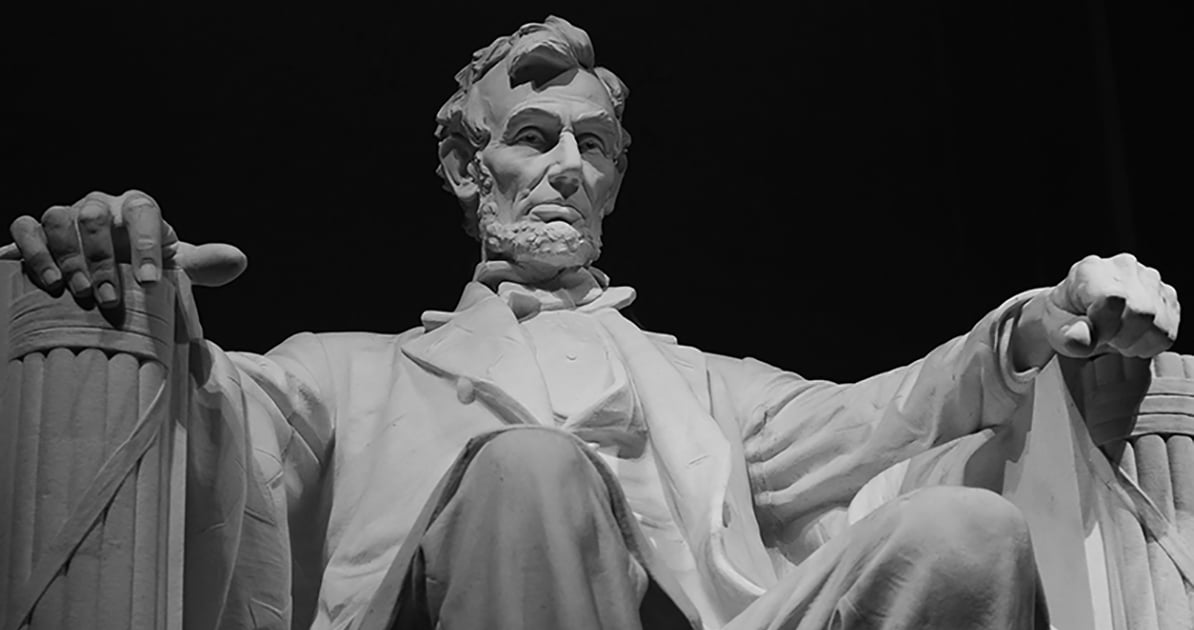5 Lessons Old Abe Taught Us About Leadership
March 1, 2023 •Jeff Owen l Arête Purpose Consulting

When you grow up in Central Illinois, you get affixed to all things Lincoln.
Besides being born and raised in the "Land of Lincoln", I learned cursive writing and multiplication tables at Lincoln Elementary School; picnicked at Lincoln Park; and got baptized and married at Lincoln United Methodist Church. My brother-in-law Steve was born on Lincoln's birthday, thus his middle name - Lincoln.
Abraham Lincoln was such a luminary in my hometown, our elementary teachers made us recite - by memory and with heart - the Emancipation Proclamation, the Gettysburg Address and the House Divided speech.
While Lincoln was held up as leaders we - as second graders - needed to become, ne'er a word was mentioned about his character flaws. Only in college did I learn that Old Abe had failings - just like ordinary folk.
Lincoln made mistakes in business, law and politics. He endured marital struggles and money problems - and suffered from depression while mourning the loss of his young sons to illness and the decision to send young men and boys to die in war.
Perhaps his imperfections are why we can appreciate his adept ability to lead - especially through our country's most dire political epoch.
Biographers, such as Doris Kearns Goodwin in her book "Team of Rivals", conclude that Lincoln's leadership skills derived from two gifts - a keen analytical dexterity and a remarkable sense of emotional fortitude.
Scholars also say Lincoln left behind a bevy of leadership lessons that are applicable today:
Engage people with opposing views in your decision process
Lincoln's election as president was not even close to a mandate. He knew and understood he needed political capital to accomplish the people's business. So, he included in his Cabinet those who ran and campaigned against him. He sought their counsel when considering his management of the war, his policies on the economy and his legislative fight to end slavery. He kept his friends close and his enemies closer. He wrote often about the importance of collaboration - and how having only "yes men" in the White House didn't really serve the country's best interest - although they could have praised his every decision and strengthened his sense of self-worth.
Modesty is the best policy
The East Coast cultural and political establishment of that time poked fun of Lincoln. He did not graduate from college, let alone a prestigious one. He wore rumpled suits, walked with a slouch and talked with a Midwestern twang. Yet he did not need nor sought affirmation from the elite. He understood the struggles of the common American because he grew up as one. Lincoln also would never ask his team or political allies to do anything he wouldn't do. And when he made mistakes, he confessed and publicly owned up to them.
If you don't know something, look it up
Poor leaders operate under the mistaken notion that they know everything about everything. (Otherwise, they reason, they never would have been promoted or elected to their position.) Such pomposity can result in organizational disaster. Lincoln valued life-long learning. He knew nothing about the law when he was a young man. So, he traveled from town to town in Illinois and served as an apprentice on thousands of cases. He was not a trained military man. Yet, he spent endless hours with generals, colonels, lieutenants and privates during the Civil War - asking questions and becoming knowledgeable of military strategies and tactics. He challenged himself to learn and then lead. He surrounded himself with experts who knew more than he did about the most pertinent issues of his time.
Connect to the people at all times
Lincoln did not operate the country nor protect his ego from the confines of an inner circle. Lincoln valued his Cabinet and military commanders. However, he allowed common citizens to enter the White House and share their concerns. Families of Union soldiers had his ear as often as General Grant. Despite his remarkable intellect, he communicated with everyday citizens using parables and stories learned in his simple youth. Lincoln walked freely among the common people in his country - engaging them but more importantly listening to them.
At the end of the day, have confidence in yourself
Lincoln could command a room with his homespun stories and salty jokes. He often made himself the butt of his humor. If you think today's presidential political environment is nasty, look up the newspaper cartoons skewering Lincoln before his election and during his time in office. Yet, despite his bouts of personal despair and the weight of war, Lincoln remained self-assured about his abilities. He held a sense of purpose whether chopping wood as a boy, traveling the legal circuit as a young lawyer or speaking before troops before their great battles.
Because he was such a prolific writer and orator, Lincoln's leadership lessons can be studied in many of his letters and newspaper accounts of his speeches - available in books at the library or on the Internet.
Or you can find them written on an elementary school bulletin board, where he reminds the next generation of leaders:
"Whatever you are, be a good one."
Jeff Owen is a Partner with Arête Purpose Consulting and is a Partner with Clever Dogs Media. He has lived in two states that claim Lincoln as their own - Illinois and Indiana.

